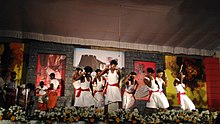Malapulayattam
 Malapulayattam performance | |
| Native name | മലപ്പുലയാട്ടം (Malayalam) |
|---|---|
| Genre | Ritual |
| Instrument(s) | tribal instruments like chik vadyam, kitimitti, kuzhal, kattavadyam, urumi etc. |
| Origin | Kerala, India |
Malapulayattam also known as Chikk Attam is a tribal dance performed by the Malapulayan tribals of Idukki district in Kerala, as part of worshiping the deities Mariamman, Kaliyamman and Meenakshi in their caste-related festivals.
This ritualistic dance is also performed in public spaces outside Idukki as part of public programs and tribal festivals.
Overview
[edit]Malappulyars are a tribal community living in Marayur, Idukki district in Kerala.[1][2] They are immigrants from Tamil Nadu.[1] Their worship idols are deities like Mariamman, Kaliyamman and Meenakshi.[1] Malappulayattam is a tribal dance form performed as part of worshiping the deities in their caste-related festivals.[1]
There is a festival held in the Tamil month of Chithirai in connection with the Mariyamman temple in Malapulayan tribal area.[3] Malapulayattam is mainly held as a part of this.
Malapulaya people also perform Malapulayattam or Chik Attam at all important events in their daily life including marriage, birth and even death and girl child's first menstruation.[4] Only death has a different rhythm.[4] Malapulayattam is a very physically demanding folk dance.[1]
This ritualistic tribal dance is also performed in public spaces outside Idukki as part of public programs and tribal festivals.[2][5][6]
Dance
[edit]In Malappulayattam, everyone, including the elderly and the disabled, of the tribal colony, together steps in front of their clan deity.[3] Males and females will step together in traditional attire.[3] The dance is not supported by vocal singing.[3] Both men and women dance together and dancers change frequently.[3] Watchers later become dancers and dancers become watchers.[3]
Dancers move their bodies forward and backward from a circle.[2] The pace of the dance will also increase according to the pace of rhythms.[2]
Instruments
[edit]Tribal musical instruments such as chik vadyam, kitimitti, kuzhal, kattavadyam, urumi etc. are used for rhythm.[3][7] While dancing, they do not sing any songs, instead they dance in a circle to the rhythm of musical instruments. [8]
Noted performances
[edit]In the 2022 national level tribal dance fest held in Visakhapatnam, Andhra Pradesh, which featured tribal dances from 19 states of India, the official group of Kerala, Malappalaya Dance Group from Kummittamkuzhi, Marayur, won the best team award.[7]
References
[edit]- ^ a b c d e "മലപ്പുലയാട്ടം | Malayapulayattam". keralaculture.org. 11 August 2019. Archived from the original on 11 August 2019. Retrieved 13 April 2023.
{{cite web}}: CS1 maint: bot: original URL status unknown (link) - ^ a b c d "പാട്ടില്ലാതെ താളവും ചുവടുകളും മൂന്നാറില് നവ്യാനുഭവമായി മലപ്പുലയാട്ടം". ETV Bharat News (in Malayalam). ETV Network. Archived from the original on 2023-04-13. Retrieved 2023-04-13.
- ^ a b c d e f g "ചലനത്തിന്റെ ചാരുതയില് മലപ്പുലയാട്ടം". Deshabhimani (in Malayalam). Archived from the original on 2023-04-13. Retrieved 2023-04-13.
- ^ a b ",ആദിവാസിക്കുടികളില് ചിക്ക് ആട്ടവിശേഷം ,Kerala - Mathrubhumi". mathrubhumi.com. Mathrubhumi. 2014-05-11. Archived from the original on 2014-05-11. Retrieved 2023-04-16.
- ^ "അന്താരാഷ്ട്ര ആദിവാസി ദിനാചരണം നാളെ". Kerala Kaumudi. Archived from the original on 2023-04-13. Retrieved 2023-04-13.
- ^ "പരമ്പരാഗത നൃത്തം ആസ്വദിക്കാൻ അനന്തപുരിക്ക് ഇന്ന് അത്യപൂർവ അവസരം | I&PRD : Official Website of Information Public Relations Department of Kerala". www.prd.kerala.gov.in. Archived from the original on 2023-04-13. Retrieved 2023-04-13.
- ^ a b "മലപ്പുലയ ആട്ടം ദേശീയ ശ്രദ്ധയിൽ; ട്രൈബൽ ഡാൻസ് ഫെസ്റ്റിൽ മലപ്പുലയ ആട്ടത്തിന് അംഗീകാരം". ManoramaOnline (in Malayalam). Malayala Manorama. Archived from the original on 2023-04-16. Retrieved 2023-04-16.
- ^ KIRTADS, Adikalakendram (2013). പട്ടിക വർഗ്ഗ കലാരൂപങ്ങൾ, കലാസമിതികൾ, കലാകാരന്മാർ, കരകൗശലവിദഗ്ദ്ധർ (Schedule caste art forms, art societies, artists and artisans). Kozhikode: Kerala institute for Research Training & Development studies of Scheduled Castes and Scheduled Tribes. p. 11.
